Boilers are required for heating your home and providing hot water. They keep us warm in the winter and help us with everyday tasks like taking showers or washing dishes. But like all machines, boilers can wear out over time. When your boiler starts to malfunction, you may wonder whether it’s better to keep repairing Read more
Whats New
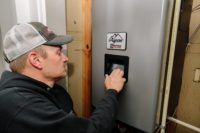
Boilers are required for heating your home and providing hot water. They keep us warm in the winter and help us with everyday tasks like taking showers or washing dishes. But like all machines, boilers can wear out over time.
When your boiler starts to malfunction, you may wonder whether it’s better to keep repairing it or to replace it entirely. Deciding when to replace your boiler instead of opting for emergency repairs can be tricky, but knowing the signs can help you make the right decision.
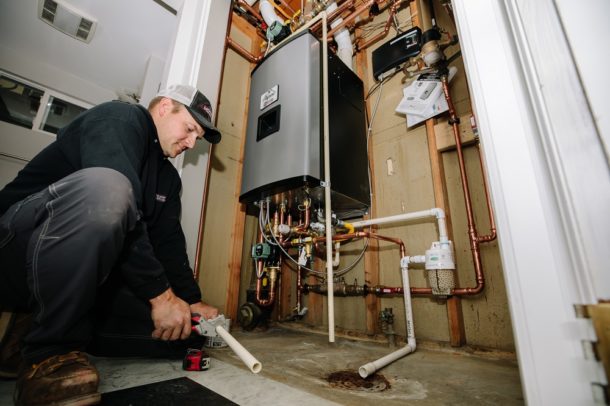
How Boilers Work and Why They Break Down
A boiler heats water using gas, oil, or electricity, which is then circulated through pipes to provide heat and hot water to your home. Over time, parts of the boiler can wear down due to use, dirt, or age. Boilers usually last around 10-15 years, but some may need replacement earlier depending on their condition and usage.
A well-maintained boiler can last longer, but wear and tear are inevitable. If your boiler is not regularly serviced, it can develop problems that are costly to fix. In some cases, emergency repairs might be a quick fix, but they don’t solve underlying issues. This is where the decision to replace your boiler comes into play.
What are the Signs to Replace Your Boiler
Several signs suggest it might be time to replace your boiler. These include frequent breakdowns, rising energy bills, strange noises, and age. Identifying these early helps you avoid expensive, ongoing repairs and ensures a more efficient, reliable heating system that keeps your home comfortable throughout the year. These factors can be:
1. Age of the Boiler
Boilers generally last 10-15 years, but this can vary depending on how well the unit is maintained. If your boiler is over 10 years old, it might be time to consider replacing it, even if it’s still working. Older models are less energy-efficient, which means they could be costing you more money in energy bills. Newer models, on the other hand, are designed to be more efficient, saving you money in the long run.
2. Rising Energy Bills
A boiler that’s working harder than it should will increase your energy bills. If you’ve noticed that your heating costs are rising and your boiler is still operating as usual, it could be a sign that it’s no longer functioning efficiently. Older boilers lose heat through cracks or poorly insulated parts, forcing them to consume more energy. Replacing your boiler with a more efficient model could cut down on energy costs significantly.
3. Frequent Breakdowns
If your boiler has broken down several times in the past year and you find yourself constantly needing emergency repairs, it might be time to replace it. While some issues can be fixed with simple repairs, repeated breakdowns often signal that the boiler is reaching the end of its life. Constant repairs can become more expensive than investing in a new, reliable model.
4. Strange Noises or Leaks
If your boiler is making unusual sounds like banging, clanging, or whistling, it’s a sign that something is wrong inside. These noises could indicate air or limescale buildup, which can lead to more serious issues if ignored. Leaking water or steam is another red flag. While minor leaks can sometimes be repaired, large or persistent leaks usually point to a failing boiler that’s better off being replaced.
Why Replacing Your Boiler Is the Better Long-Term Investment
Replacing your boiler might seem like a big upfront cost, but in the long run, it’s usually the better investment. Newer boilers are designed to be much more energy-efficient than older models, which can save you a significant amount on your energy bills. Older boilers lose heat more easily and require more energy to maintain the same level of warmth, making them expensive to run.
If you’re looking for emergency boiler repair Long Island services, contact NH Ross, a trusted provider of emergency boiler repair, to discuss your options and determine the best solution for your home’s heating needs. A new boiler will not only offer more reliability and fewer breakdowns but also give you peace of mind knowing that you’re less likely to face unexpected issues. The upfront cost of a new boiler can often be offset by savings on repairs and energy bills over time.
How Replacing Your Boiler Reduces Maintenance and Improves Reliability
Replacing your old boiler offers significant advantages in terms of reliability and reduced maintenance. Newer boilers are built to be more durable, requiring less frequent servicing and repairs.
This not only saves you money on emergency repairs but also ensures your heating system runs smoothly throughout the year. With fewer breakdowns and improved performance, a new boiler gives you peace of mind and keeps your home comfortable.
FAQs
How do I know if my boiler needs replacing?
If your boiler is over 10 years old, constantly breaks down, or your energy bills keep rising, it’s a good sign that replacement may be necessary. Frequent repairs and decreasing efficiency indicate that it’s no longer performing well and could be costing you more in the long run.
How much does it cost to replace a boiler?
The cost of replacing a boiler can vary depending on the model and installation. While it requires an upfront investment, the long-term savings on energy bills and fewer repairs make it a valuable choice.
Conclusion
In the long run, replacing your boiler instead of relying on continuous emergency repairs can save you both money and frustration. If your boiler is old, inefficient, or frequently breaking down, opting for a replacement ensures you avoid the recurring costs of repairs while improving the overall efficiency of your home’s heating system.
A new boiler will provide better performance, lower energy bills, and greater reliability, ultimately offering more value over time. By making this investment now, you can enjoy consistent comfort and peace of mind, knowing that your home’s heating needs are met without constant disruption.

When it comes to running your own business, you can generally be quite busy. From the beginning, you may find that you’re doing a lot of the work yourself. This means that you might end up having a heavy workload and feeling quite overwhelmed from time to time. If this happens, it could be the Read more
When it comes to running your own business, you can generally be quite busy. From the beginning, you may find that you’re doing a lot of the work yourself. This means that you might end up having a heavy workload and feeling quite overwhelmed from time to time. If this happens, it could be the case that you might want to try and work on balancing out your stress levels a little bit. Let’s take a look at some ways you can do that.
Create a Business Plan for Guidance
First of all, one of the best things you can do for yourself here is to think about pulling together a business plan. With a business plan in place, it can act like a bit of a guide for you to refer to. If you know that you tend to get overwhelmed, knowing that you have a master plan to guide you can feel really reassuring.

Set Boundaries
The next thing that will help you here is to make sure that you’re putting strong boundaries in place. As you start to feel more stressed out about things in life, you need to be stronger with what you agree to. Sometimes, saying no is the best answer here. If you know that you tend to take on too much and it’s all getting on top of you, reinforcing boundaries can make all of the difference.
Hire an Assistant
From here, you might also benefit from hiring an assistant. If you’re always trying to do everything yourself, this is only ever going to add to the stress that you’re feeling. So instead, you may benefit from bringing in an assistant to help you with all the tasks that you need to get done. It might be the case that you want to delegate admin tasks that you always have on your plate or look to share the bulk of the workload you have as an entrepreneur.
Outsource to Experts
Alongside this, you might find that you also want to bring in key experts too. It’s safe to say that you can’t do everything yourself. It’s also likely to be the case that you’re not an expert in every area of the business too – so actually, the business will benefit from it. From hiring a marketing consultant or agency and bringing in an accountant to outsourcing your customer services or warehouse fulfillment, there’s a lot for you to consider here. This will lighten your workload and allow you to relax a little.
Enjoy the Perks of Business
At the same time, you should also think about ways to minimize the impact of stress on your life and enjoy it more. When it comes to business, there are always perks that we maybe don’t get to enjoy – such as business discounts, travel, and tax benefits too. So why not make the most of them? The next time you’re traveling for work, why not look out for luggage storage Sydney or wherever you may be, store your possessions before heading home and get out to explore a bit. Looking to balance your time between business and personal here can really be beneficial to your life and the experiences you have.
Prioritize Wellbeing in the Company
If you are dealing with stress as the owner, you might also find that your employees are also carrying the burden of it too. So here, it can be important to think about bringing the right health and wellbeing initiatives into the workplace too. We live in a time where we’re all becoming much more aware of our health and the increasing stress levels we all have to deal with. So, you may find that bringing in initiatives, such as wellbeing days and relaxation perks, can really make a difference to everyone.
Take Time Off
Finally, you may find that taking time off is incredibly important for this. It can be hard when you’re a business owner, as you may find that you actually end up working more than you did when you were an employee. But if you know that you are suffering from more stress than usual, you’re going to want to do something about it. If you’re working all hours, you’re only ever going to be doing your health and wellbeing more harm than good. So instead, you may find that you need to prioritize taking more time off going forward. It’s essential for you to be able to enjoy some downtime, switch off, and take care of your mind and body as you do so.

Hiring the right electrician for complex home projects is essential for safety and quality. A licensed electrician ensures the work meets local codes, is done professionally, and minimizes potential risks. Whether you’re renovating, upgrading lighting, or rewiring your home, a skilled electrician brings the expertise needed to handle technical tasks effectively. Their experience ensures everything Read more
Hiring the right electrician for complex home projects is essential for safety and quality. A licensed electrician ensures the work meets local codes, is done professionally, and minimizes potential risks.
Whether you’re renovating, upgrading lighting, or rewiring your home, a skilled electrician brings the expertise needed to handle technical tasks effectively. Their experience ensures everything functions correctly, preventing future issues and ensuring peace of mind.
Why Choosing the Right Electrician Matters
Electrical work is one of the most essential aspects of a home’s safety and functionality. Poorly done electrical work can lead to accidents, fires, or expensive damage down the road. A licensed electrician not only ensures that your home is up to current electrical codes, but they also offer peace of mind knowing that the job will be done right. Taking the time to choose a qualified electrician can save you a lot of hassle in the long run.
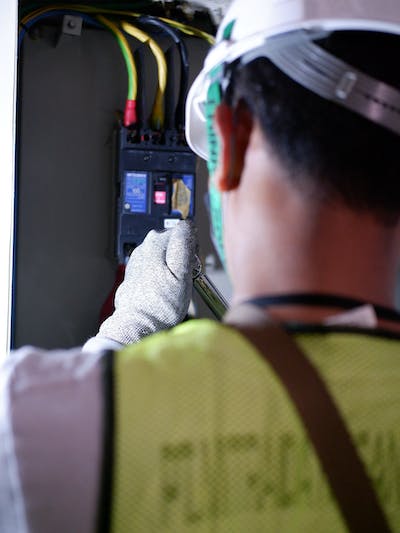
What are the Key Factors to Consider When Hiring an Electrician
Preferring the right licensed electrician for your project requires careful consideration. It’s important to evaluate their qualifications, experience, and reputation to ensure they can handle complex electrical tasks efficiently and safely.
Comprehending what to look for will help you make an informed decision and avoid costly mistakes. Here are the factors you should look at when you are going to hire an electrician:
Check for Proper Licensing and Insurance
Before anything else, confirm that the electrician holds the appropriate licenses and insurance for your area. Most cities and states require electricians to have specific licenses to ensure they are qualified to perform electrical work safely. You should always ask for proof of licensing and insurance before hiring an electrician for any residential project.
Experience with Complex Residential Projects
While general electrical work is common, complex residential projects may require a more experienced professional. Look for an electrician who has specific experience with the type of project you’re planning. If you’re upgrading your electrical panel or installing a new circuit, you’ll need someone who has handled similar tasks before.
Ask potential electricians about their experience with projects similar to yours. A seasoned professional will not only complete the work more efficiently but also identify and solve problems that might arise.
Read Reviews and Get Recommendations
Online reviews and recommendations from family or friends can give you a clearer picture of an electrician’s work ethic, reliability, and professionalism. Look for reviews that mention punctuality, quality of work, and communication skills. If your neighbors have recently done major electrical work, ask them for recommendations.
It’s also helpful to check websites that rate service providers in your area, as they often have detailed feedback on electricians and their performance.
Verify References and Past Work
Ask the electrician for references from past clients who had similar projects. A reputable electrician will have no trouble providing you with contact information for satisfied customers. You can also ask to see pictures of completed projects or visit a site in progress to get a better sense of the quality of their work.
Communication and Professionalism
Clear communication is key to a successful electrical project. Pay attention to how the electrician communicates with you during the initial consultation. Do they explain things in a way you can understand? Are they responsive to your questions and concerns? You want to hire someone who listens to your needs and communicates their plan.
How to Find a Licensed Electrician
Finding the right professional for your project is important. Start by searching online or using websites that list licensed and insured electricians. Recommendations from neighbors, hardware stores, or contractors can also be helpful. Hiring a licensed electrician near you ensures that your electrical work is handled by someone skilled and reliable.
Local electricians offer key advantages. They are familiar with regional codes, have strong reputations in the community, and can respond quickly during emergencies. Picking a nearby expert ensures quality and efficiency for your home project.
What are the Important Safety Precautions
Hiring a licensed electrician ensures that safety standards are followed during the job. Electrical work can be dangerous, so the electrician must follow all safety regulations.
A professional electrician will use the proper protective equipment, tools, and procedures to keep both themselves and your home safe. By adhering to safety protocols, they minimize risks and ensure that the job is done correctly, preventing accidents or potential hazards down the line.
Conclusion
Selecting the right licensed electrician is essential to ensuring the safety, quality, and efficiency of your complex residential project. By thoroughly researching qualifications, getting multiple quotes, and confirming experience, you can avoid potential risks and costly mistakes.
Taking these steps helps ensure that the work is done to code, professionally, and without future issues. A qualified electrician will provide peace of mind and long-term reliability for your home’s electrical needs.
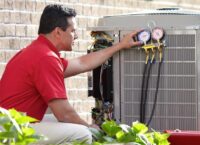
Your HVAC system plays a critical role in maintaining comfort and air quality in your home, especially during the sweltering summer or chilly winter months. However, like any mechanical system, it can encounter issues over time. Ignoring early warning signs can lead to expensive repairs or even system failure, leaving you in an uncomfortable situation Read more
Your HVAC system plays a critical role in maintaining comfort and air quality in your home, especially during the sweltering summer or chilly winter months. However, like any mechanical system, it can encounter issues over time. Ignoring early warning signs can lead to expensive repairs or even system failure, leaving you in an uncomfortable situation.
Here are 5 key signs that your HVAC system needs immediate repair and attention from professionals like A/c Man Heating & AC Repair Fayetteville.
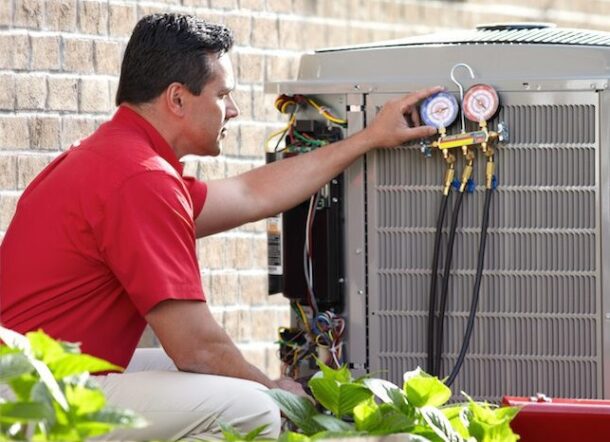
1. Unusual Noises Coming from the System
While some HVAC systems generate a low hum during operation, loud or strange noises are a cause for concern. Common problematic sounds include:
- Banging or Clanging: This could indicate a loose or broken internal part, such as the blower fan or motor components.
- Hissing or Whistling: A potential refrigerant leak or ductwork issue could be to blame.
- Grinding or Squealing: These sounds may point to worn-out bearings or a malfunctioning blower motor.
If you hear any of these sounds, it’s best to call for professional HVAC repair services immediately. Waiting too long could lead to further damage and higher repair costs.
2. Inconsistent or Weak Airflow
Poor airflow is a clear indicator that something is wrong with your HVAC system. If certain rooms feel colder or warmer than others, or if the airflow feels weak, it might be due to:
- Clogged air filters obstructing airflow.
- Faulty blower motors that fail to push air effectively through the vents.
- Leaky ductwork leading to air loss.
Inconsistent airflow not only disrupts home comfort but can also force your HVAC system to work harder, increasing energy bills. A technician can inspect and restore proper airflow quickly.
3. Unexpected Spike in Energy Bills
Have you noticed a sudden increase in your monthly energy bills without a change in usage? This is often a sign of an inefficient HVAC system struggling to operate due to underlying issues. Some causes may include:
- A malfunctioning thermostat
- Dirty coils or filters
- Refrigerant leaks
An inefficient system consumes more energy while delivering subpar performance. A professional HVAC technician can identify the problem, perform necessary repairs, and ensure your system runs efficiently.
4. Frequent Cycling On and Off
If your HVAC system turns on and off too frequently (a phenomenon called short cycling), it’s a warning sign that shouldn’t be ignored. Short cycling can occur due to:
- A faulty thermostat that inaccurately reads indoor temperatures.
- Improperly sized HVAC systems for your home.
- Overheating caused by dirty filters or coils.
Short cycling puts a strain on your HVAC system, reduces its lifespan, and increases energy consumption. Scheduling prompt repairs can prevent long-term damage and costly replacements.
5. Unpleasant Odors Coming from Vents
Any unusual smell coming from your HVAC system should raise a red flag. Some common odors include:
- Musty Smells: A sign of mold or mildew growth within your HVAC unit or ducts, often caused by moisture buildup.
- Burning Smell: Indicates electrical issues or overheating components that need immediate inspection.
- Rotten Egg Smell: A rare but serious sign of a gas leak (if your HVAC system is gas-powered).
Unpleasant odors can impact indoor air quality and pose health risks. A professional HVAC technician can identify the root cause and clean or repair your system to eliminate the smell.
Don’t Ignore the Warning Signs
Addressing HVAC problems early can save you time, money, and discomfort. Delaying repairs can escalate small issues into major breakdowns, potentially requiring expensive replacements.
At A/c Man Heating & AC Repair Fayetteville, we specialize in diagnosing and repairing HVAC issues promptly. Our skilled technicians ensure your system operates efficiently year-round, keeping your home comfortable no matter the season.
If you notice any of the warning signs above, don’t wait. Schedule an inspection with A/c Man Heating & AC Repair Fayetteville today and experience reliable HVAC solutions from trusted local experts.
Why Choose A/c Man Heating & AC Repair Fayetteville?
- Expert HVAC repairs and maintenance
- Prompt, professional, and reliable service
- Solutions tailored to your home’s unique needs
Let us help you restore comfort to your home. Contact us today!

As winter sets in, the temperature drops more and more. Everyone needs to prepare for that, and entrepreneurs are no different. You’ll need to protect your business in winter to make sure it keeps operating without any problems. A lot of this revolves around safety. By putting the time and effort into it, you’ll keep Read more
As winter sets in, the temperature drops more and more. Everyone needs to prepare for that, and entrepreneurs are no different. You’ll need to protect your business in winter to make sure it keeps operating without any problems. A lot of this revolves around safety.
By putting the time and effort into it, you’ll keep your workers, customers, and other third-parties safe on your premises. You’ve no reason not to put the effort in.
As obvious as that is, it seems harder to put into practice. You mightn’t know where to start, other than making sure your premises is a warm place to work. While you’ll have to put more time and effort into it, it doesn’t have to be complicated.
It should just be a matter of taking the right steps, and you shouldn’t have much to worry about. Seven of these should help a lot more than others. They’ll be more than worth it.
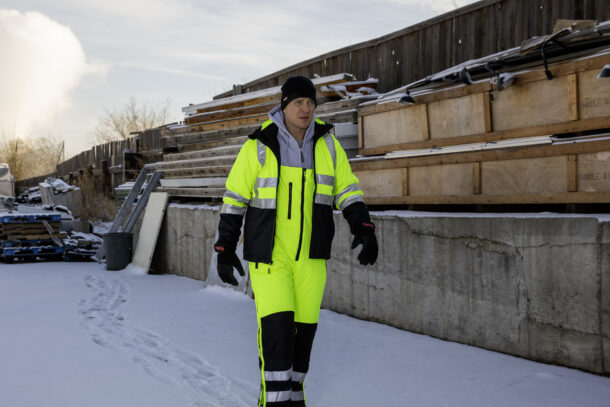
Protect Your Business in Winter: 7 Steps to Take
1. Seal Drafts & Air Leaks
You wouldn’t want the cold outside to make its way into your business, so it’s worth taking measures to make sure it doesn’t. This doesn’t just mean keeping windows and doors clean and turning the heating on. You’ll also need to take care of any drafts and air leaks around your business.
These are usually found around your doors and windows, where holes and cracks can often turn up. Deal with these as soon as you can. You’ll make sure there aren’t any drafts to worry about, helping to keep your business safe from a noticeable drop in temperature.
2. Get Rid of Snow & Ice
The winter months normally bring a decent bit of ice, and even a bit of snow. While these can be great to look at, they also pose a safety risk when you’re working. You’ll need to deal with them before any accidents happen. Make sure you do this whenever there’s any ice or snow.
For the ice, it could just be a matter of putting down some salt to melt it. Make sure to dry it off. At the same time, a cordless snow blower helps with the snow. Clear out any areas employees or customers will be using.
3. Protect Sensitive Equipment
Your business could use quite a bit of equipment, and some of this might be sensitive to the temperature. They’ll need to be within a certain temperature range to function the way it’s supposed to. Make sure it’s within that range at all times to prevent any issues with it.
Don’t overlook humidity and moisture in the air while you’re at it. This can wreak havoc on any kind of equipment, causing breakdowns and even a few potential safety threats. Protective covers and similar measures can help to protect against this, making it more than worth the time and effort.
4. Insulate Pipes & Water Lines
Your business premises will have more than a few pipes and water lines, and many of these can be exposed to the weather. For most of the year, this isn’t a problem. During the winter, though, the temperature drop could lead to these pipes freezing over. You’ll have to prevent that.
Insulating your pipes and water lines is the best way to do this. It’ll help make sure the pipes don’t freeze over or burst, saving you a lot of time and hassle. You’ll prevent more than a few issues, and it shouldn’t even take much time to get done.
5. Clear Gutters & Downspouts
Your gutters and downspouts are supposed to drain water away from your business. This is vital during the winter months, when there’s a lot of snow and rain. For the gutters and downspouts to actually do that, they’ll need to be cleared out regularly. This prevents any buildup that could prevent water from draining.
It’ll also prevent any water from freezing over and causing more damage during the winter months. When you’re clearing out the gutters and downspouts, it’s worth looking for any signs of damage. By fixing anything that pops up, you’ll prevent a few safety risks and further damage later on.
6. Maintain Heating Systems
Your business will naturally use its heating system quite a bit more during the winter months. It helps make sure your business is comfortable to work in, while preventing cold-related illnesses. As recommended as this is, it means making sure your heating systems are well-maintained when you’re using them.
Give them a once-over before using them to make sure there isn’t any damage or wear and tear. Once it’s working properly, it’s a matter of inspecting it regularly for any wear and tear. Don’t overlook any mechanical areas with this, as you wouldn’t want the system breaking down later on.
7. Don’t Neglect the Roof
It’s natural to focus on the most commonly used areas around your business when you’re protecting it during the winter. Don’t overlook a few key areas while you’re at it. The roof is one of the more notable, and it’s worth making sure this is as well-looked after as possible.
Snow could build up on it and cause some damage, depending on the weight of the snow. At a minimum, you risk water damage around your business premises. Take the time to get rid of the snow before it builds up. Take care of any other damage while you’re at it.

Protect Your Business in Winter: Wrapping Up
You should already know you’ll have to protect your business in winter. You’ll have to do it year-round, but you could need to put more time and effort into it during the winter months. The drop in temperature and change in weather make this a priority, especially when it comes to safety.
While you’ll know that, actually putting the time and effort into it seems overwhelming. This shouldn’t be as difficult as you could think, though. It’s just a matter of taking the right steps, and you should have more of an impact than you would’ve thought.
